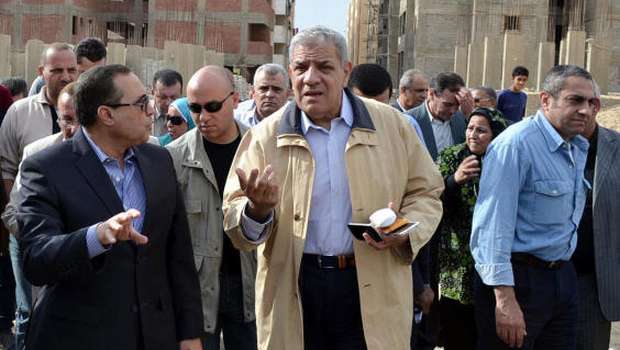
In this Nov. 24, 2013 file photo, Ibrahim Mahlab, center, tours a government housing project in Ismailiya, Egypt. (AP Photo/Khaled Kandil, File)
Ibrahim Mahlab made his appeal in an address televised live on his first full day on the job after he and members of his Cabinet were sworn in on the previous day by Interim President Adly Mansour.
Mahlab was named prime minister last week following the surprise resignation of his predecessor, Hazem El-Beblawi, after seven tumultuous months in office. Egypt experienced bloodshed and mass detentions as authorities staged a massive crackdown on supporters of ousted Islamist President Mohamed Mursi and, in recent weeks, an increasing number of strikes.
“Stop all kinds of sit-ins, protests and strikes. Let us start building the nation,” Mahlab said.
“No voice must be louder than the voice of construction and development,” said Mahlab. “Your demands will be taken very seriously, but I also know how much you love your country and your desire to build and elevate it,” he said.
The turmoil sweeping Egypt since the 2011 ouster of Hosni Mubarak has devastated the economy, particularly the vital tourism sector.
Egypt’s system gives most powers to the president, but the prime minister handles day-to-day economic affairs. Mahlab’s appeal echoed others made by his post-2011 predecessors that failed to check the seemingly endless wave of protests and strikes since.
One prime minister, Kamal El-Ganzouri, famously broke down in tears as he discussed Egypt’s economic plight.
Protesters have usually brushed off the charge that they are destroying the economy. They blame government mismanagement for hardships that include unemployment, inflation and a surge in crime.
In addition to its economic woes, Egypt is battling an insurgency in the northern part of the Sinai Peninsula as well as a wave of bomb attacks in mainland cities, particularly Cairo.
Mahlab declared security to be his top priority. “The battle that Egypt is waging against the forces of evil and terror is not just in defense of Egypt’s interests and safety, but rather it is a battle we are fighting on behalf of the entire region and we will win it, God willing,” he said.
In recent weeks Egyptians have been complaining of frequent power outages, something which does not bode well for the summer since the consumption of electricity is normally much lower in winter than in the months of Egypt’s searing heat.
Media reports are saying fuel shortages are beginning to impact on areas outside Cairo. Power outages last year fed discontent against Mursi.
The new Cabinet was sworn in as the nation waited for the country’s military chief and defense minister, Field Marshal Abdel-Fattah El-Sisi, to make his widely anticipated announcement that he would run in presidential elections slated for April. El-Sisi, who ousted Mursi last July, is likely to be waiting for a new election law currently being vetted by senior judges to be passed and for the election commission to formally invite hopefuls to register.
El-Sisi, 59, is expected to win a landslide, with his only serious competition coming from leftist politician Hamdeen Sabahy, who finished a surprise third in presidential election in 2012.
